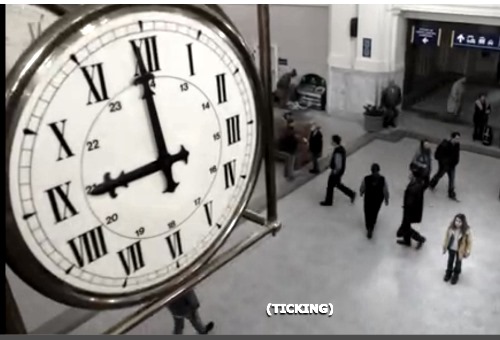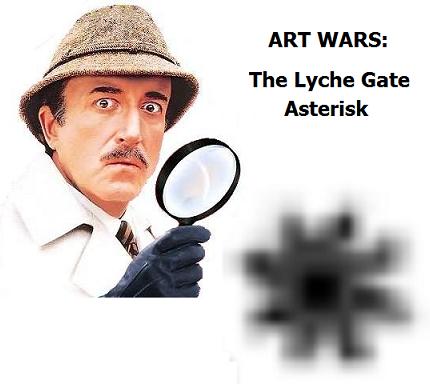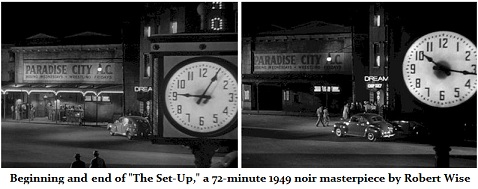See Devil's Bible, Early Nothing, and A Good Time.
Wednesday, January 28, 2015
Monday, November 3, 2014
Wisconsin Death Trip*
Courtesy of Mira Sorvino.
Enter Madison :

From “Intruders,” BBC America, Season 1, Episode 2, at 1:07 of 43:31.
“You sure know how to show a girl a good time.“
* The title is a reference to a Wisconsin-related Halloween post.
Monday, November 25, 2013
Windows
Ben Brantley reviewing a show by the X-Men patriarchs
that opened on Sunday:
"This isn’t just a matter of theatergoers chuckling
to show that they’re smart and cultured and had
damn well better be having a good time after
forking out all that money…."
I prefer reality (which includes the life of Fred Kavli) :
See also Saturday's posts Chess and Frame Tale.
Whether the patriarch Kavli, pictured above, is now having
a good time, I do not know. I hope so.
Monday, December 20, 2010
Contenders

Happy birthday to noir queen Audrey Totter. She starred in “The Set-Up,” a 1949 fight film.
“You sure know how to show a girl a good time.”
— Renée Zellweger in “New in Town” (2009)
Saturday, May 22, 2010
In the Details
Today's New York Times—
|
"…there were fresh questions about whether the intelligence overhaul that created the post of national intelligence director was fatally flawed, and whether Mr. Obama would move gradually to further weaken the authorities granted to the director and give additional power to individual spy agencies like the . Mr. Blair and each of his predecessors have lamented openly that the intelligence director does not have enough power to deliver the intended shock therapy to America’s byzantine spying apparatus." |
Catch-22 in Doonesbury today—

From Log24 on Jan. 5, 2010—
Artifice of Eternity—
A Medal
In memory of Byzantine scholar Ihor Sevcenko,
who died at 87 on St. Stephen's Day, 2009–
Thie above image results from a Byzantine
meditation based on a detail in the previous post—

"This might be a good time to
call it a day." –Today's Doonesbury
"TOMORROW ALWAYS BELONGS TO US"
Title of an exhibition by young Nordic artists
in Sweden during the summer of 2008.
The exhibition included, notably, Josefine Lyche.
Wednesday, August 19, 2009
Wednesday August 19, 2009
From a 1984 book review:
"After three decades of intensive research by hundreds of group theorists, the century old problem of the classification of the finite simple groups has been solved and the whole field has been drastically changed. A few years ago the one focus of attention was the program for the classification; now there are many active areas including the study of the connections between groups and geometries, sporadic groups and, especially, the representation theory. A spate of books on finite groups, of different breadths and on a variety of topics, has appeared, and it is a good time for this to happen. Moreover, the classification means that the view of the subject is quite different; even the most elementary treatment of groups should be modified, as we now know that all finite groups are made up of groups which, for the most part, are imitations of Lie groups using finite fields instead of the reals and complexes. The typical example of a finite group is
— Jonathan L. Alperin,
review of books on group theory,
Bulletin (New Series) of the American
Mathematical Society 10 (1984) 121, doi:
10.1090/S0273-0979-1984-15210-8

The same example
at Wolfram.com:
Citation data from Wolfram.com:
"GL(2,p) and GL(3,3) Acting on Points"
from The Wolfram Demonstrations Project,
http://demonstrations.wolfram.com/GL2PAndGL33ActingOnPoints/,
Contributed by: Ed Pegg Jr"
As well as displaying Cullinane's 48 pictures of group actions from 1985, the Pegg program displays many, many more actions of small finite general linear groups over finite fields. It illustrates Cullinane's 1985 statement:
"Actions of GL(2,p) on a p×p coordinate-array have the same sorts of symmetries, where p is any odd prime."
Pegg's program also illustrates actions on a cubical array– a 3×3×3 array acted on by GL(3,3). For some other actions on cubical arrays, see Cullinane's Finite Geometry of the Square and Cube.
Thursday, August 3, 2006
Thursday August 3, 2006
Let Noon Be Fair
Comment at Peter Woit’s weblog today:
“Would this be a good time to bring up the social habits of ancient Greek mathematicial philosophers?”
Answer to this rhetorical question:
“De veras! It’s so romantic!”
— Let Noon Be Fair, by Willard Motley
Related material:
- The closing entries for Log24
in 2002 (Dec. 28-31), - Log24, May 18-19, 2006, and
- last night’s performance of
Mozart’s K. 265 (“Twinkle, Twinkle”)
on Live from Lincoln Center.



